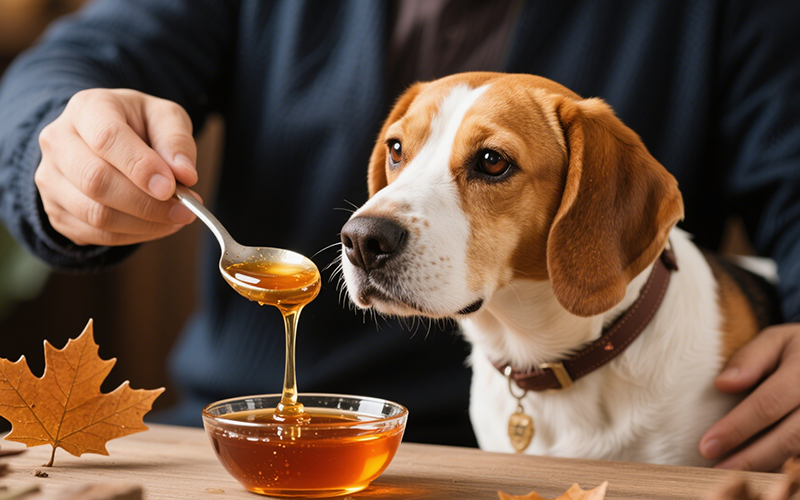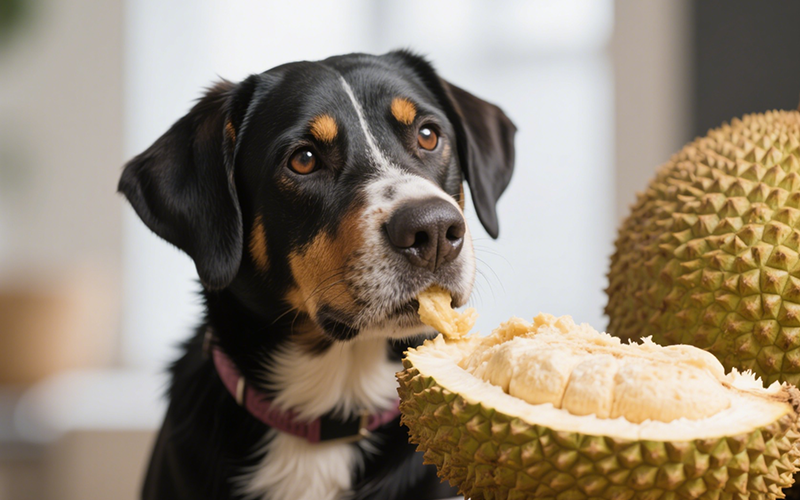Can Dogs Eat Maple Syrup? The Sugary Truth & Why Vets Advise Against It
- 16 Apr 2025 10:37
Maple syrup – that sweet, amber liquid often drizzled generously over pancakes and waffles – is a beloved treat in many households. As you enjoy its distinct flavor, your canine companion might watch with interest, perhaps catching a drip or hoping for a lick. This common scenario prompts the question: can dogs eat maple syrup? While pure maple syrup isn't inherently toxic like chocolate or xylitol, the answer from veterinarians and canine nutritionists is generally **NO**. Maple syrup is essentially pure sugar, offering no nutritional benefits for dogs and posing health risks related to sugar overload and potential toxic ingredients in artificial syrups.
This comprehensive guide, grounded in veterinary nutritional science and adhering to E-E-A-T (Expertise, Authoritativeness, Trustworthiness) principles, will explain why maple syrup is an unhealthy and unsuitable choice for dogs. We'll delve into its composition, the significant health risks associated with high sugar intake, the critical dangers of artificial syrups containing xylitol, and why safe, species-appropriate treats are always the better option for your furry friend.

What is Maple Syrup? Pure vs. Artificial
Understanding the different types of syrup is crucial:
Pure Maple Syrup: Made by boiling down the sap of maple trees (usually sugar maple, red maple, or black maple). It primarily consists of **sucrose (sugar)** and water, along with trace amounts of minerals (like manganese and zinc) and antioxidants. Its defining characteristic is its extremely high sugar content.
Artificial "Maple-Flavored" Syrup (Pancake Syrup): These are typically cheaper syrups designed to mimic maple flavor. They usually contain:These artificial syrups are highly processed and even less suitable for dogs than pure maple syrup.
High Fructose Corn Syrup (HFCS) or Corn Syrup:** The primary ingredient.
Water
Cellulose Gum (Thickener)
Salt
Artificial Flavors
Caramel Color
Preservatives (e.g., Sodium Benzoate, Sorbic Acid)
Potentially XYLITOL (in "sugar-free" or "lite" versions) – **EXTREMELY TOXIC**
Is Maple Syrup Toxic to Dogs? The Xylitol Danger
Let's address toxicity first:
Pure Maple Syrup: **Not toxic** in the sense of containing a specific poison. However, its extremely high sugar content makes it unhealthy and potentially harmful in anything more than a minuscule taste.
Artificial Maple-Flavored Syrup: This is where the **MAJOR TOXICITY RISK** lies. "Sugar-free" or "lite" pancake syrups are increasingly using **XYLITOL** as a sweetener. Xylitol is **HIGHLY TOXIC and potentially LETHAL** to dogs, even in very small amounts.
Mechanism:** Causes a rapid, massive insulin release, leading to a life-threatening drop in blood sugar (hypoglycemia) and potential acute liver failure.
Symptoms:** Vomiting, weakness, lethargy, staggering, collapse, seizures.
Action:** Xylitol ingestion is a **critical emergency requiring immediate veterinary intervention.**
Rule:** NEVER feed any "sugar-free" or "lite" syrup to a dog unless you can meticulously verify xylitol is absent. Given the risk, it's safest to avoid all artificial syrups entirely.
Therefore, while pure maple syrup isn't poisonous, artificial syrups carry a significant risk of deadly xylitol poisoning. This risk alone is a major reason to keep all syrups away from dogs.
Health Risks of Feeding Pure Maple Syrup to Dogs (Sugar Overload!)
Even if you only consider 100% pure maple syrup (which is essentially concentrated sugar water), feeding it to dogs poses several health risks:
1. Extreme Sugar Content
This is the primary issue with pure maple syrup.
Obesity:** Maple syrup is incredibly calorie-dense due to sugar. Added sugars contribute significantly to weight gain and obesity, increasing the risk of numerous secondary health problems (arthritis, diabetes, heart disease, etc.).
Diabetes Risk & Management Issues: The rapid spike in blood sugar caused by consuming pure sugar is detrimental for diabetic dogs and can contribute to insulin resistance or diabetes development in predisposed dogs over time.
Dental Disease:** Sugar is the main fuel for harmful bacteria in the mouth, leading to plaque, tartar, cavities, gum disease, and tooth loss. Sticky syrup adheres easily to teeth.
Digestive Upset:** A sudden influx of concentrated sugar can disrupt the gut microbiome and overwhelm the digestive system, causing vomiting, diarrhea, gas, and stomach pain.
Hyperactivity:** Some dogs may experience temporary hyperactivity or a "sugar rush" followed by a crash.
The high sugar in maple syrup makes it inherently unhealthy for dogs, offering no nutritional benefits to justify its consumption.
2. Lack of Nutritional Value
While pure maple syrup contains trace minerals like manganese and zinc, the amounts are negligible relative to the massive sugar load. It provides virtually no protein, fiber, or essential fatty acids. It's essentially "empty calories" for a dog.
3. Potential for GI Upset
As mentioned, the concentrated sugar can easily irritate the digestive tract and cause vomiting or diarrhea, especially if more than a tiny lick is consumed.
"What About Just a Tiny Lick?" Why It's Still Not Ideal
Even letting your dog have a small taste of pure maple syrup isn't recommended:
Concentrated Sugar:** It's still a direct hit of sugar with no benefit.
Reinforces Bad Habits:** Teaches dogs that sweet human foods are acceptable treats, potentially leading to begging or ingestion of more dangerous sweets later (like those containing xylitol).
Mistaken Identity:** Could lead to confusion where artificial syrup (potentially containing xylitol) is accidentally given later.
Zero Necessity:** Dogs don't need or benefit from sugary flavors.
While a tiny drop of pure maple syrup likely won't cause immediate harm to a healthy adult dog, there's simply no good reason to offer it. The safest policy is complete avoidance.
What To Do If Your Dog Eats Maple Syrup: Action Plan
If your dog gets into maple syrup:
Identify the Type:** Was it pure maple syrup or artificial pancake syrup? **Check the label of artificial syrup IMMEDIATELY for XYLITOL.**
Estimate Quantity:** How much was consumed? A small lick or a significant spill?
Remove Access:** Prevent further ingestion.
**Contact Your Veterinarian or Pet Poison Helpline IMMEDIATELY IF:**
You know or suspect the syrup contained **XYLITOL** (Critical Emergency!).
A large amount of *any* syrup (pure or artificial) was consumed.
Your dog is diabetic, overweight, or has other health conditions.
Your dog shows *any* signs of distress: vomiting, diarrhea, lethargy, weakness, staggering, tremors, seizures, collapse (especially critical with potential xylitol).
Provide Details:** Inform the vet/helpline about the type of syrup, ingredients (especially xylitol), quantity, time eaten, and your dog's details/symptoms.
Follow Veterinary Advice:** Xylitol poisoning requires immediate, aggressive veterinary treatment. For large ingestions of pure maple syrup, monitoring for severe GI upset or blood sugar issues might be advised.
Knowing what to do if dog eats maple syrup depends heavily on whether it was pure or artificial (xylitol risk).
Healthy & Safe Treat Alternatives
Skip the sugary syrups and offer treats that benefit your dog's health:
| Treat Option | Why It's Better Than Maple Syrup |
| Maple Syrup (Pure or Artificial) | UNSAFE: Extreme Sugar, Potential Xylitol Toxicity (Artificial), Low Nutrition, Obesity/Dental/Diabetes Risk. Avoid. |
| Dog-Safe Fruits (e.g., Blueberries, Small Apple Slices - no core/seeds) | Natural sweetness (use moderately), vitamins, antioxidants, fiber. No harmful additives. Excellent safe sweet alternative (in moderation). |
| Dog-Safe Vegetables (e.g., Carrots, Green Beans, Cucumber) | Low calorie, vitamins, fiber. Safe, healthy, often crunchy. |
| Plain Cooked Lean Meat (Tiny Pieces) | High-quality protein, highly palatable. No sugar or harmful additives if plain & lean. |
| Commercial Dog Treats (High Quality, Low Sugar/Grain-Free Options) | Specifically formulated for dogs. Check ingredients, choose reputable brands, monitor calories. |
Limit treats to 10% of daily calories.
Need Quick Pet Food Safety Info? PettureX is Ready!
Navigating the safety of human foods for pets can be tricky, especially with hidden dangers like xylitol. The PettureX App offers innovative AI-powered tools for pet parents:
Food & Ingredient Checker: Use image recognition or search to quickly check general safety information about human foods like maple syrup and toxic ingredients like xylitol.
AI Symptom Analysis: If your pet ingests something harmful and shows symptoms, input the details for preliminary AI insights to help guide your conversation with your vet.
24/7 AI Vet Consultation: Get immediate answers to urgent questions like, "What should I do if my dog ate sugar-free syrup?" or seek guidance on managing potential ingestion incidents anytime.
PettureX provides valuable, instant support. Remember, however, it offers preliminary guidance and **cannot replace professional veterinary diagnosis, treatment, or emergency care.** Always contact your local veterinarian or a pet poison helpline immediately for definitive medical advice, especially in cases of suspected xylitol poisoning.
Conclusion: Maple Syrup - A Sweet Treat Best Kept from Dogs
To definitively answer the question "can dogs eat maple syrup?": **NO**, it is not safe or healthy for them and should be avoided.
Key Reasons to Keep Maple Syrup Away:
Extreme Xylitol Risk in artificial "sugar-free" or "lite" syrups (potentially fatal).
Excessive Sugar Content in pure maple syrup (risks obesity, dental disease, diabetes, GI upset).
Lack of any significant nutritional value for dogs.
Potential for other harmful additives in artificial syrups.
Protect your dog's health by ensuring they don't have access to maple syrup or foods containing it. Choose safe, species-appropriate treats that contribute positively to their well-being instead of posing unnecessary risks. When it comes to sugary syrups, avoidance is the sweetest policy for your canine friend.
Related

Can Dogs Eat Peaches? Vet Explains Benefits, Cyanide Risks & Safe Serving
- 16 Apr 2025
Can Dogs Eat Mulberries? Vet Explains Safety, Benefits & Potential Risks
- 16 Apr 2025
Can Dogs Eat Mozzarella? Vet Explains the Cheesy Truth (Risks & Benefits)
- 16 Apr 2025
Can Dogs Eat Mango Skin? Vet Explains Why It's a Risky Chew!
- 16 Apr 2025
Can Dogs Eat Mac n Cheese? Vet Explains Why This Comfort Food Is Unsafe!
- 16 Apr 2025
Can Dogs Eat Liver? Vet Guide to This Nutrient-Dense Organ Meat (Benefits & Risks!)
- 16 Apr 2025
Can Dogs Eat Lamb? Vet Insights on This Nutritious Meat Option
- 16 Apr 2025
Can Dogs Eat Licorice? The Sweet Danger & Glycyrrhizin Risk Explained by Vets
- 16 Apr 2025
Can Dogs Eat Jelly? The Sweet Truth About Sugar, Xylitol & Why Vets Say No!
- 16 Apr 2025
Can Dogs Eat Jackfruit? Vet Explains Potential Risks & Safe Preparation
- 15 Apr 2025
